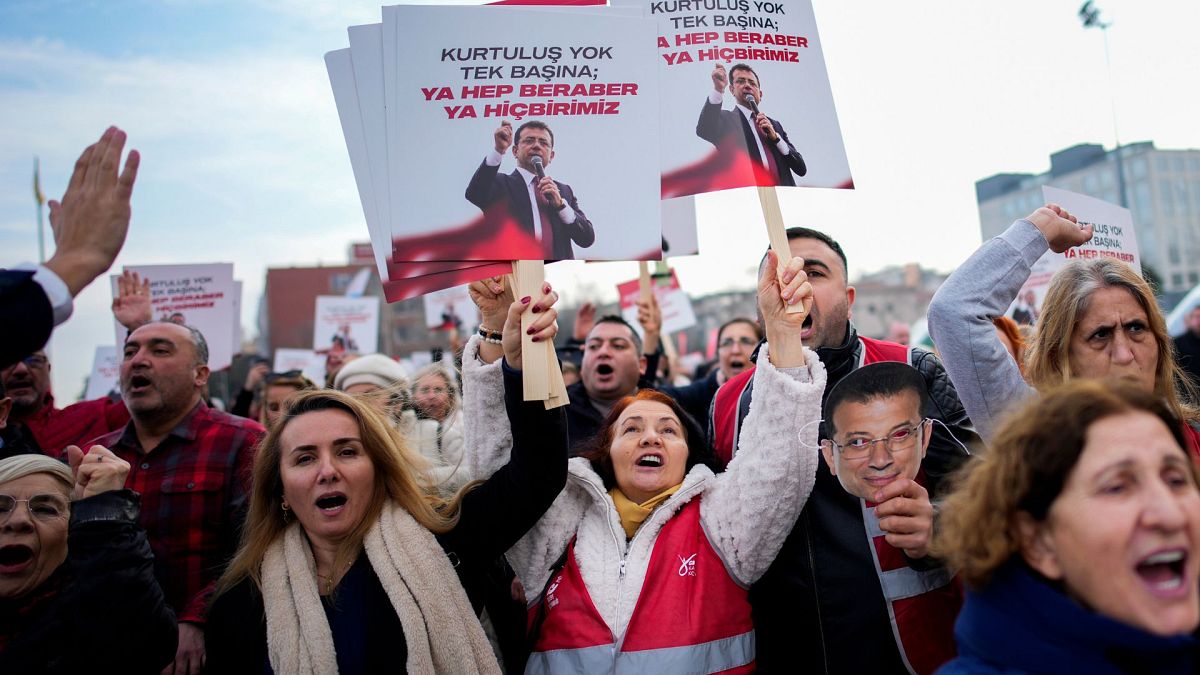Europe
Turkey detains 10 officials in crackdown on opposition in Istanbul

The Crackdown on Opposition in Istanbul: A Growing Concern
Introduction
In recent days, Istanbul has witnessed a wave of detentions targeting senior officials from opposition-run district municipalities. The Turkish police, acting on allegations of links to Kurdish militants, detained 10 individuals, including deputy mayors and municipal council members. These detentions have raised significant concerns about the widening crackdown on opposition figures in Turkey’s largest city. The arrests are part of a broader pattern of political repression under President Recep Tayyip Erdoğan’s government, which critics argue is aimed at silencing dissent and consolidating power. This chapter explores the detentions, the allegations behind them, and the broader political context in which they occurred.
The Detentions and Allegations
On Tuesday, Turkish police detained 10 senior officials from opposition-run district municipalities in Istanbul. The detainees included deputy mayors from the Kartal and Ataşehir districts, as well as eight district municipal council members. All of those detained are members of the Republican People’s Party (CHP), Turkey’s main opposition party. The state-run Anadolu Agency reported that the arrests were made over allegations of appointing individuals with ties to the Kurdistan Workers’ Party (PKK), a group designated as a terrorist organization by Turkey, to municipal positions. The authorities claim that this alleged infiltration allowed the PKK to exert influence over local governance. However, critics argue that these detentions are part of a broader campaign to undermine the opposition and discredit key figures, particularly Istanbul Mayor Ekrem Imamoglu, who is seen as a potential challenger to President Erdoğan.
The Targeting of Istanbul Mayor Ekrem Imamoglu
Istanbul Mayor Ekrem Imamoglu has been a focal point of the government’s crackdown on the opposition. Since taking office, Imamoglu has faced multiple legal challenges, including a conviction in 2022 for insulting public officials. This conviction carries the potential consequence of a five-year ban from politics if upheld by higher courts. Imamoglu has directly blamed President Erdoğan for the recent detentions, stating on the social media platform X that the arrests were a result of the "whims of one person who considers himself above the will of the people." Critics argue that the detentions and legal challenges against Imamoglu are part of a strategy to weaken his political standing and prevent him from emerging as a viable challenger to Erdoğan in future elections.
The Broader Crackdown on Opposition Figures
The detentions in Istanbul are not an isolated incident but part of a larger pattern of repression targeting opposition figures across Turkey. Since the 2022 local elections, in which the CHP made significant gains nationwide, several of its elected officials have been arrested or removed from office. For instance, the mayor of Esenyurt was arrested last year over alleged PKK links, while the mayor of Beşiktaş was detained earlier this year on charges of bid-rigging and bribery. Both mayors have denied the allegations, which they claim are politically motivated. Additionally, several mayors from the pro-Kurdish People’s Equality and Democracy Party (DEM) have been ousted and replaced by government-appointed trustees, also over alleged PKK affiliations. The DEM party has strongly denied these claims, asserting that they are baseless and aimed at stifling political opposition.
The Government’s Denial of Judicial Interference
Despite widespread criticism, President Erdoğan’s government denies exerting pressure on the judiciary, insisting that Turkey’s courts operate independently. However, the pattern of arrests and legal challenges against opposition figures has led many to question the independence of the judiciary and the fairness of the legal process. Critics argue that the government is using the courts as a tool to silence dissent and consolidate power, particularly ahead of future elections. The targeting of opposition leaders, they claim, is part of a broader strategy to undermine democratic institutions and ensure the continued dominance of Erdoğan’s ruling Justice and Development Party (AKP).
Conclusion: Implications for Democracy and Opposition
The detentions in Istanbul and the broader crackdown on opposition figures raise serious concerns about the state of democracy in Turkey. The targeting of elected officials and the use of legal challenges to silence dissent are tactics that undermine the principles of democratic governance and the rule of law. As Turkey approaches future elections, the continued repression of opposition figures could have significant implications for the country’s political landscape. The international community has expressed growing concern over these developments, calling for greater respect for democratic principles and the protection of political rights. For now, the situation in Istanbul remains a focal point in the ongoing struggle between the government and the opposition, with the outcome likely to shape the future of Turkish politics for years to come.


















